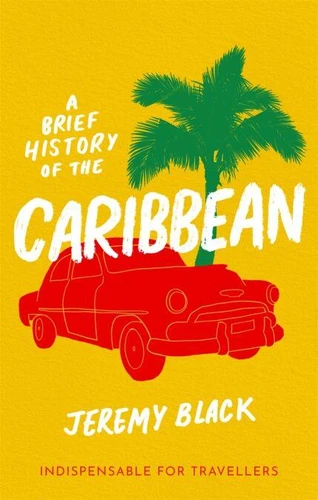A Brief History of the Caribbean. Indispensable for Travellers
Par :Formats :
Disponible dans votre compte client Decitre ou Furet du Nord dès validation de votre commande. Le format ePub protégé est :
- Compatible avec une lecture sur My Vivlio (smartphone, tablette, ordinateur)
- Compatible avec une lecture sur liseuses Vivlio
- Pour les liseuses autres que Vivlio, vous devez utiliser le logiciel Adobe Digital Edition. Non compatible avec la lecture sur les liseuses Kindle, Remarkable et Sony
- Non compatible avec un achat hors France métropolitaine
 , qui est-ce ?
, qui est-ce ?Notre partenaire de plateforme de lecture numérique où vous retrouverez l'ensemble de vos ebooks gratuitement
Pour en savoir plus sur nos ebooks, consultez notre aide en ligne ici
- Nombre de pages320
- FormatePub
- ISBN978-1-4087-1347-1
- EAN9781408713471
- Date de parution30/06/2021
- Protection num.Adobe DRM
- Infos supplémentairesepub
- ÉditeurRobinson
Résumé
A concise history of the Caribbean's long and fascinating history, from pre-contact civilisations to the present day This is a concise history, intended for travellers, but of inestimable value to anyone looking for an overview of the Caribbean and its mainland coastal states, with a focus on the past few centuries. The history of the Caribbean does not make much sense without factoring in the cities - Pensacola, New Orleans, Galveston - and the ambitions of the states on its continental shores, notably the United States.
This account is grounded in a look at the currents and channels of the sea, and its constraints, such as the Mosquito Coast, followed by the history of 'pre-contact' civilisations, focusing on the Maya and the Toltec Empire. With the arrival of the Europeans, from the late fifteenth century to the early years of the seventeenth century, the story becomes one of exploration, conquest and settlement.
Black charts the rise of slave economies and the Caribbean's place in the Atlantic world, also the arrival of the English - Hawkins and Drake - to challenge the Spanish. He examines the sugar and coffee slave economies of the English, French, Spanish and Dutch, also the successful rebellion in Haiti in the eighteenth century, and how the West Indies were further transformed by the Louisiana Purchase, the American conquest of Florida and the incorporation of Texas.
He discusses the impact of Bolivar's rebellion in Spanish America, the end of slavery in the British Caribbean, and war between Mexico and America; also the defeat of the South by the Union, the American takeover of the Panama Canal project from France, and the Spanish-American War. The first half of the twentieth century focuses on growing US power: intervention in Mexico, Honduras, Nicaragua, Panama, Haiti and the Dominican Republic; Cuba as an American protectorate, and civil wars in Mexico.
The Cold War brought new tensions and conflict to the region, but the same period also saw the rise of the leisure industry. The last part of the book looks at the Caribbean today - political instability in Venezuela and Colombia, crime in Mexico, post-Castro Cuba - and the region's future prospects.
This account is grounded in a look at the currents and channels of the sea, and its constraints, such as the Mosquito Coast, followed by the history of 'pre-contact' civilisations, focusing on the Maya and the Toltec Empire. With the arrival of the Europeans, from the late fifteenth century to the early years of the seventeenth century, the story becomes one of exploration, conquest and settlement.
Black charts the rise of slave economies and the Caribbean's place in the Atlantic world, also the arrival of the English - Hawkins and Drake - to challenge the Spanish. He examines the sugar and coffee slave economies of the English, French, Spanish and Dutch, also the successful rebellion in Haiti in the eighteenth century, and how the West Indies were further transformed by the Louisiana Purchase, the American conquest of Florida and the incorporation of Texas.
He discusses the impact of Bolivar's rebellion in Spanish America, the end of slavery in the British Caribbean, and war between Mexico and America; also the defeat of the South by the Union, the American takeover of the Panama Canal project from France, and the Spanish-American War. The first half of the twentieth century focuses on growing US power: intervention in Mexico, Honduras, Nicaragua, Panama, Haiti and the Dominican Republic; Cuba as an American protectorate, and civil wars in Mexico.
The Cold War brought new tensions and conflict to the region, but the same period also saw the rise of the leisure industry. The last part of the book looks at the Caribbean today - political instability in Venezuela and Colombia, crime in Mexico, post-Castro Cuba - and the region's future prospects.
A concise history of the Caribbean's long and fascinating history, from pre-contact civilisations to the present day This is a concise history, intended for travellers, but of inestimable value to anyone looking for an overview of the Caribbean and its mainland coastal states, with a focus on the past few centuries. The history of the Caribbean does not make much sense without factoring in the cities - Pensacola, New Orleans, Galveston - and the ambitions of the states on its continental shores, notably the United States.
This account is grounded in a look at the currents and channels of the sea, and its constraints, such as the Mosquito Coast, followed by the history of 'pre-contact' civilisations, focusing on the Maya and the Toltec Empire. With the arrival of the Europeans, from the late fifteenth century to the early years of the seventeenth century, the story becomes one of exploration, conquest and settlement.
Black charts the rise of slave economies and the Caribbean's place in the Atlantic world, also the arrival of the English - Hawkins and Drake - to challenge the Spanish. He examines the sugar and coffee slave economies of the English, French, Spanish and Dutch, also the successful rebellion in Haiti in the eighteenth century, and how the West Indies were further transformed by the Louisiana Purchase, the American conquest of Florida and the incorporation of Texas.
He discusses the impact of Bolivar's rebellion in Spanish America, the end of slavery in the British Caribbean, and war between Mexico and America; also the defeat of the South by the Union, the American takeover of the Panama Canal project from France, and the Spanish-American War. The first half of the twentieth century focuses on growing US power: intervention in Mexico, Honduras, Nicaragua, Panama, Haiti and the Dominican Republic; Cuba as an American protectorate, and civil wars in Mexico.
The Cold War brought new tensions and conflict to the region, but the same period also saw the rise of the leisure industry. The last part of the book looks at the Caribbean today - political instability in Venezuela and Colombia, crime in Mexico, post-Castro Cuba - and the region's future prospects.
This account is grounded in a look at the currents and channels of the sea, and its constraints, such as the Mosquito Coast, followed by the history of 'pre-contact' civilisations, focusing on the Maya and the Toltec Empire. With the arrival of the Europeans, from the late fifteenth century to the early years of the seventeenth century, the story becomes one of exploration, conquest and settlement.
Black charts the rise of slave economies and the Caribbean's place in the Atlantic world, also the arrival of the English - Hawkins and Drake - to challenge the Spanish. He examines the sugar and coffee slave economies of the English, French, Spanish and Dutch, also the successful rebellion in Haiti in the eighteenth century, and how the West Indies were further transformed by the Louisiana Purchase, the American conquest of Florida and the incorporation of Texas.
He discusses the impact of Bolivar's rebellion in Spanish America, the end of slavery in the British Caribbean, and war between Mexico and America; also the defeat of the South by the Union, the American takeover of the Panama Canal project from France, and the Spanish-American War. The first half of the twentieth century focuses on growing US power: intervention in Mexico, Honduras, Nicaragua, Panama, Haiti and the Dominican Republic; Cuba as an American protectorate, and civil wars in Mexico.
The Cold War brought new tensions and conflict to the region, but the same period also saw the rise of the leisure industry. The last part of the book looks at the Caribbean today - political instability in Venezuela and Colombia, crime in Mexico, post-Castro Cuba - and the region's future prospects.






















